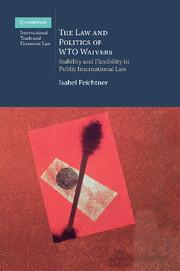Book contents
- Frontmatter
- Contents
- Acknowledgements
- 1 Why study the WTO waiver?
- Part I The stability/flexibility challenge in public international law and particularly the WTO
- Part II The practice and law of waivers
- 4 The waiver power and practice of the GATT 1947 and the WTO
- 5 The law of waivers
- Part III The potential of waivers to address the stability/flexibility challenge in international law
- Bibliography
- Index
- References
5 - The law of waivers
Published online by Cambridge University Press: 05 December 2011
- Frontmatter
- Contents
- Acknowledgements
- 1 Why study the WTO waiver?
- Part I The stability/flexibility challenge in public international law and particularly the WTO
- Part II The practice and law of waivers
- 4 The waiver power and practice of the GATT 1947 and the WTO
- 5 The law of waivers
- Part III The potential of waivers to address the stability/flexibility challenge in international law
- Bibliography
- Index
- References
Summary
This chapter analyses the waiver practice in doctrinal terms. It presents the legal rules with respect to waivers conceptualized as acts of secondary law. The WTO is usually referred to as the prime example for a highly legalized international regime. This is due in particular to the detailed content of the substantive legal rules as well as the compulsory dispute settlement system. As regards, however, the procedural rules that govern the activities of the WTO's organs, the WTO, like most other international organizations, evidences a rather low degree of legalization in that there is only little written law on procedure. This makes it all the more important to take a close look at the institutional practice to identify the complete body of norms that legally frame the exercise of the waiver power.
Qualification as secondary legal acts
With the entry into force of the WTO Agreement, the WTO – an organ-ization with legal personality (Art. VIII:1 WTO Agreement) – was established and WTO members attributed to it the power to take legally binding waiver decisions. This power is to be exercised by the Ministerial Conference and the General Council acting on its behalf. The waiver power is defined by the requirements laid down in Art. IX:3 and 4 WTO Agreement and in the Understanding in Respect of Waivers of Obligations under the General Agreement on Tariffs and Trade 1994. Further procedural rules have been laid down in decisions adopted under the GATT and in the WTO.
- Type
- Chapter
- Information
- The Law and Politics of WTO WaiversStability and Flexibility in Public International Law, pp. 163 - 274Publisher: Cambridge University PressPrint publication year: 2011

